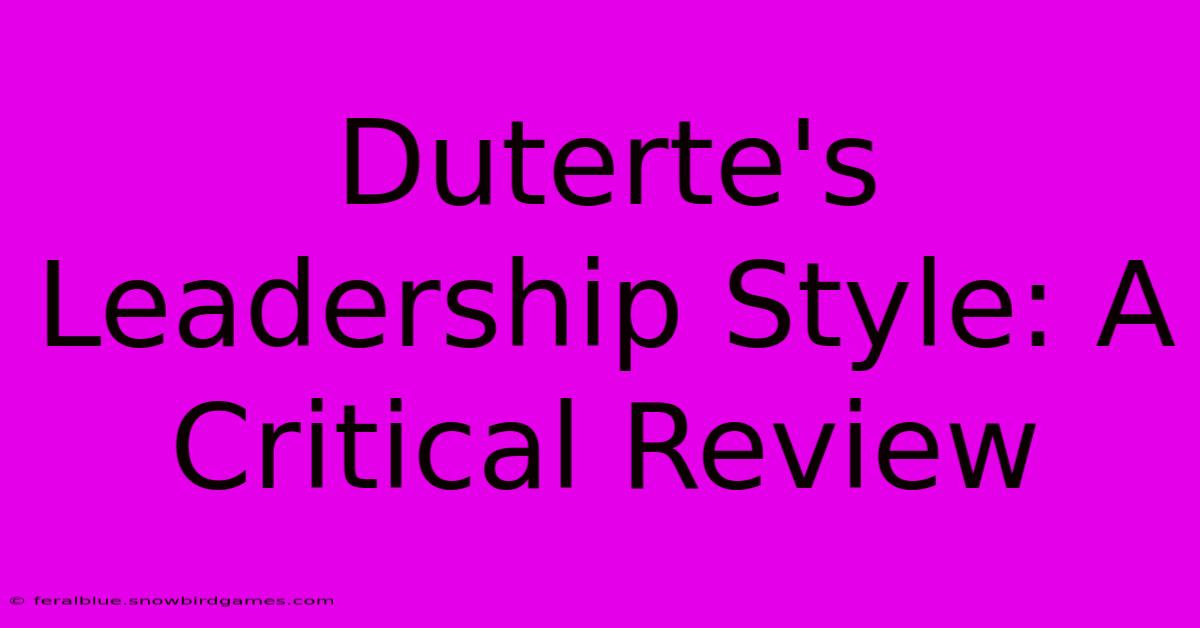Duterte's Leadership Style: A Critical Review

Table of Contents
Duterte's Leadership Style: A Critical Review
Rodrigo Duterte's presidency of the Philippines (2016-2022) was marked by a distinctive and often controversial leadership style. Characterized by populism, strongman tactics, and a disregard for conventional political norms, his approach continues to generate intense debate and scrutiny. This article provides a critical review of Duterte's leadership, examining its strengths, weaknesses, and long-term implications for the Philippines.
The "Iron Fist" Approach: Key Characteristics of Duterte's Leadership
Duterte's leadership was fundamentally shaped by his "iron fist" approach. This involved:
Populist Appeal and Direct Communication:
He cultivated a strong connection with the Filipino masses through direct, often informal, communication. His use of strong language, sometimes bordering on vulgarity, resonated with a segment of the population weary of traditional politicians. This direct engagement, bypassing established media, allowed him to control the narrative and bypass traditional checks and balances.
Authoritarian Tendencies and Disregard for Due Process:
His administration was criticized for its authoritarian tendencies, including the suppression of dissent and a disregard for due process. The controversial "war on drugs," characterized by extrajudicial killings, stands as a stark example of this approach. Human rights organizations raised serious concerns about the scale of human rights violations.
Centralization of Power:
Duterte centralized power significantly, weakening checks and balances within the government. This concentration of power facilitated swift decision-making but also increased the risk of unchecked authority and potential abuses.
Evaluating the Impact: Successes and Failures
While Duterte's leadership yielded certain successes, it also resulted in significant failures that outweigh any positive aspects.
Economic Initiatives:
Some economic improvements were seen during his tenure, including infrastructure development under the "Build, Build, Build" program. However, the long-term sustainability and equitable distribution of these benefits remain questionable.
The "War on Drugs": A Moral and Ethical Catastrophe:
The "war on drugs" remains Duterte's most controversial legacy. While aiming to curb drug abuse, the campaign resulted in thousands of extrajudicial killings, widespread human rights abuses, and a climate of fear. This policy inflicted immense suffering on countless families and significantly damaged the Philippines' international reputation.
Foreign Policy Shifts:
Duterte pursued an independent foreign policy, pivoting away from traditional allies like the United States and forging closer ties with China. While this strategy aimed to enhance national sovereignty, it also generated concerns about the Philippines' strategic alignment and economic vulnerability.
Long-Term Implications and Lasting Legacy
Duterte's presidency left a complex and lasting legacy on the Philippines. The long-term implications of his leadership style are still unfolding:
- Erosion of Democratic Institutions: The centralization of power and the weakening of checks and balances pose a significant threat to the long-term health of Philippine democracy.
- Human Rights Concerns: The human rights abuses committed during his tenure continue to require redress and reconciliation.
- Geopolitical Realignment: The consequences of shifting alliances and foreign policy priorities are still being assessed.
Conclusion: A Critical Assessment
Duterte's leadership style was characterized by a potent blend of populism, authoritarianism, and a disregard for conventional political norms. While some economic gains were achieved, his legacy is overwhelmingly defined by the devastating human rights consequences of his policies. His administration serves as a critical case study in the dangers of unchecked power and the importance of upholding democratic principles and the rule of law. The long-term implications of his presidency demand ongoing scrutiny and analysis. The future of the Philippines depends on learning from the mistakes of the past and strengthening democratic institutions to prevent similar abuses of power.

Thank you for visiting our website wich cover about Duterte's Leadership Style: A Critical Review. We hope the information provided has been useful to you. Feel free to contact us if you have any questions or need further assistance. See you next time and dont miss to bookmark.
Featured Posts
-
Mikey Madison Net Worth And Future Projections
Apr 05, 2025
-
Prodigal Son Understanding The Lyrics Nuances
Apr 05, 2025
-
You Wont Believe Rachana Rimals Age
Apr 05, 2025
-
Ivan Lendls Net Worth His Business Ventures Revealed
Apr 05, 2025
-
The Inspiration Of Tom Moores Daughter
Apr 05, 2025
